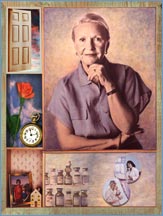Information saves sanity
When Patrick was 40 years old, he had a normal E.K.G. An E.K.G. or E.C.G. are abbreviations for an electrocardiogram. This test measures the electrical activity in the heart and can determine if the heart has been damaged.
Two years later he went to the doctor complaining of chest pain. The doctor did an E.K.G. in his office and told Patrick he had to go to the hospital immediately for further tests.
Patrick was admitted to the hospital. He and his family were frightened because Patrick's father also had experienced chest pain and had to undergo coronary artery bypass surgery. They knew that having a family member with heart disease put Patrick at higher risk of also having heart problems. Patrick and his family were very stressed from worry.
A cardiologist was directing his care but his general practitioner also visited. These doctors explained every test and kept the family updated about the results. They spoke to the family every day, keeping them informed every step of the way. The daily updates were reassuring to Patrick and his family, and helped ease their distress. It turned out that he did not have a heart attack after all. Instead, a virus had settled around his heart, causing a condition known as pericarditis. Patrick was discharged to home in four days.


